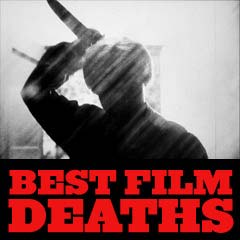
|

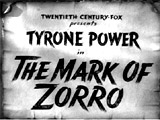
|
The Mark of Zorro (1940) In director Rouben Mamoulian's adventure-swashbuckler, there was a thrilling, magnificent dueling scene (one of the best in cinematic history). The struggle was between Zorro/Diego de Vega (Tyrone Power) and cruel villain Capt. Esteban Pasquale (Basil Rathbone). Pasquale was killed by a lethal parry. When he fell to the floor, he dislodged a framed painting that revealed a scratched 'Z' on the wall. |
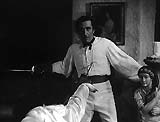 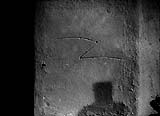 Z on the Wall |
||||||
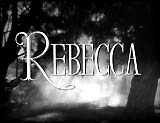
|
Crazed by the truth that was revealed about Rebecca, devoted housekeeper Mrs. Danvers (Judith Anderson) carried a lighted candle through the darkened hallways and set Manderley on fire, determined to burn the cavernous mansion. As the master of the house Maxim de Winter (Laurence Olivier) drove home from London and proceeded up the long driveway to Manderley, the sky was brightly lit by the flames of the mansion. He exclaimed:
Outside after finding each other and embracing, while they watched the great house burn behind them, Mrs. de Winter told her husband:
Mrs. Danvers was consumed in the blazing inferno as the flames burned her and the memories of her mistress. The faithful housekeeper was last seen through a West Wing window, remaining trapped inside Rebecca's bedroom with the memories of her beloved, as the burning roof caved in on top of her. |
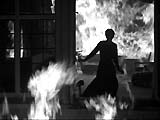 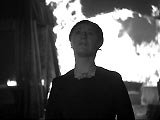 Mad Mrs. Danvers Perishing in Manderley Fire |
||||||
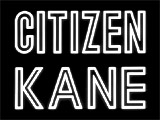
|
Charles Foster Kane (Orson Welles) succumbed after murmuring: "ROSEBUD" from giant lips (in close-up), while grasping a snow globe in his left hand. It was the first spoken words in the film. An old man had pronounced his last dying word as the snowstorm globe was released from his grip and rolled from his relaxed hand. The glass ball bounced down two carpeted steps and shattered into tiny pieces on the marble floor. A door opened and a white-uniformed nurse appeared on screen, refracted and distorted through a curve of a sliver of shattered glass fragment from the broken globe. In a dark silhouette, she folded his arms over his chest, and then covered him with a sheet. The next view was again the lit window viewed from inside. A dissolve faded to darkness. |
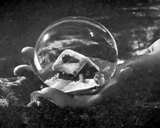 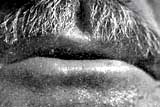 "Rosebud" 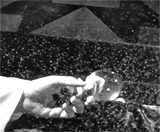 Release of Snowglobe 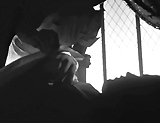 Covered With Sheet |
||||||

|
High Sierra (1941) During a suspenseful manhunt high up in the Sierra Mountains, police pursued aging gangster Roy "Mad Dog" Earle (Humphrey Bogart) in a doomed last stand when his 'tarnished angel' friend Marie (Ida Lupino) refused to call out to him, as she told the authorities:
Earle was given one "last chance" to surrender, but he replied: "That's what you say, copper!" He wrote a note on a piece of paper, to be read after his death:
When Earle heard barking from his mongrel dog Pard who was running up the steep cliff to him, he stood up and called out "Marie!" - and was shot by a sniper's bullet from behind. Marie screamed from down below. After Earle's body rolled down the steep rocky cliff, Pard licked his hand. Kneeling over Earle's dead body, a weeping Marie heard an uncaring officer sarcastically speak about the dead man:
She spoke to the officer:
The man wondered about the phrase, then responded:
When told that it meant being freed, she sadly repeated the word "Free?", questioning Roy's unnecessary death. She picked up Pard as she was escorted away and said the word "Free" one more time. The film ended with a blurry fadeout on Marie's tear-stained face as it filled the frame before a pan up to the mountains. |
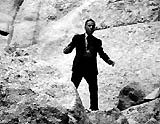 Fugitive "Mad Dog" Earle Trapped  Sniper 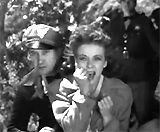 Marie (Ida Lupino) 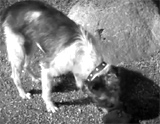 Pard Licking Earle's Hand  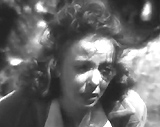 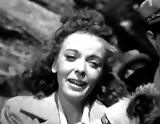 "What does it mean when a man crashes out?" |
||||||
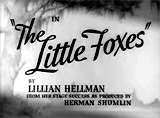
|
The Little Foxes (1941) William Wyler's turn-of-the-century melodrama (from playwright Lillian Hellman) was about Southern aristocratic wife Regina Hubbard Giddens (Bette Davis) whose well-being was due to the wealth of her estranged, sickly husband Horace (Herbert Marshall). She tolerated Horace only because of his money and status. The conniving Regina was part of the corrupt, money-driven Hubbard clan, including her two awful scheming brothers who were working on a sneaky business deal to include her:
The ruthless Regina had already been overheard (by her thoughtful and gracious daughter Alexandra (Teresa Wright)) in a lengthy conversation with Horace, when he revealed his disgust at the exploitative family's dirty dealings, and she declared that she was waiting for him to die:
And soon, the heartless Regina's merciless wish came true. Horace felt heart pain as he talked to Regina in the living room. When he went to pour his liquid medicine onto a spoon, he spilled his life-saving elixir. He begged Regina to help: "There's another bottle, please, upstairs, in my room, in the drawer." She sat unmoving and stone-faced. He struggled and stumbled as he walked to the stairs, as the camera fixated itself upon Regina in the foreground, who coldly ignored his pleas. Horace collapsed into unconsciousness as he climbed the stairs behind her and suffered a fatal heart attack, while trying to get to his heart medicine (without her deliberate lack of help) in a famous deep-focus shot. As Horace reclined on a deathbed, Dr. Sloane offered a fateful diagnosis: "It's just a matter of a little while." As a result, Regina was abandoned by her daughter Alexandra who left to marry honest newspaperman David Hewitt (Richard Carlson). |
 Horace Giddens 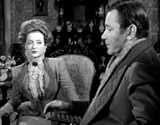 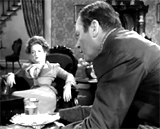 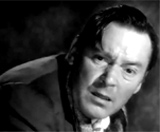  Ignoring Horace's Collapse and Heart Attack on the Stairs in the Background |
||||||
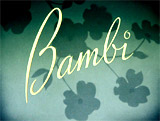
|
Bambi (1942) This was one of the most traumatic death scenes (off-screen) ever filmed. Bambi's mother sensed a human presence -- and warned her young fawn: "Bambi. Quick! The thicket!" There were gunshots as they both raced away. She encouraged: "Faster! Faster, Bambi! Don't look back. Keep running! Keep running!" Bambi ran and ducked behind a snowbank - and made it to the protective thicket, but there was a fateful gunshot. Bambi turned and exclaimed while panting: "We made it! We made it, Mother! We...", but his Mother was nowhere in sight. Bambi emerged, asking and calling out: "Mother. Mother! Mother, where are you?!" He fruitlessly searched for her during a raging snowstorm, not knowing she had been killed by a human hunter. After not finding her and hearing no response, the young fawn began to sob, and then gasped at the imposing sight of his stag father, the Great Prince of the Forest, who stated: "Your mother can't be with you anymore." A tear formed in Bambi's eye as he looked up, and was told: "Come. My son." He followed, but looked back one last time in the direction of where his mother had been. |
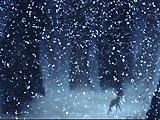 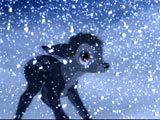  "Your mother can't be with you anymore." |
||||||

|
In self-defense, Rick Blaine (Humphrey Bogart) shot Major Heinrich Strasser (Conrad Veidt) in the film's dramatic conclusion. They were in the hangar of Casablanca's foggy airport where Rick had decisively changed plans. He ordered that Ilsa (Ingrid Bergman) should depart with her husband Victor Laszlo (Paul Henreid), possessing letters of transit from Casablanca to Lisbon. A determined Major Strasser had breathlessly rushed into the airport hangar and was informed that Victor Laszlo was on the departing airplane. Without heeding Rick's warning ("I was willing to shoot Captain Renault, and I'm willing to shoot you"), Strasser attempted to halt the plane on the runway - he ran to a phone to connect to the radio tower. Rick ordered him to put the phone down as Strasser grabbed the receiver. The Nazi leader pulled out a gun with his other hand and fired a shot at Rick - who was compelled in self-defense to shoot back. Strasser crumpled to the hangar floor - dead. A carload of French gendarmes pulled up. In the distant background, the plane was taxi-ing and turning on the runway. Five policemen ran up to the amoral Capitaine Renault (Claude Rains) who announced climactically:
In a tense, dramatically effective moment, there was a long pause. Renault first looked at Rick and then back at the gendarmes. [Would he side with Rick or protect the status quo?] Renault indicated that he would not arrest Rick, delivering a famous command to his men:
|
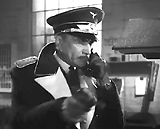  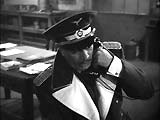 "Major Strasser has been shot." 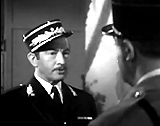 "Round up the usual suspects." |
||||||
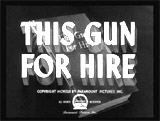
|
This Gun for Hire (1942) In the climactic finale of this famed crime film noir, expressionless, baby-faced, cat-loving hired killer Philip Raven (Alan Ladd in his first major role) died as a hero. In the upper-floor, secure office of wheelchair-bound Nitro Chemical company president Alvin Brewster (Tully Marshall), with corrupt, double-crossing, peppermint candy-loving fat man Willard Gates (Laird Cregar), both men were forced (at gunpoint by Raven) to sign a written confession; they admitted they were selling secrets about the chemical composition of poison gas to foreign agents (the Japanese). During exchanges of gunfire in a showdown, Brewster died of a heart attack (after attempting to shoot Raven with a hidden pen-gun), and Gates was shot dead by Raven, but then Raven was also lethally-wounded by arriving LAPD Detective Lieut. Michael Crane (Robert Preston) (who was suspended from a painter's scaffolding outside the window). Raven hesitated to kill Michael as Ellen helped to safely guide him into another window, before other police officers barged through the door and fired more shots at Raven. As Raven died with a rare smile on his face, they found the sabotagers' written confession exonerating Raven; Crane read the written confession that Raven had obtained from the bad guys; before expiring from his gunshot wounds, Raven was assured by blonde-haired, femme fatale Ellen Graham (Veronica Lake), Crane's fiancee, that she hadn't turned him in, after Raven asked: "You didn't tell the cops, did ya?" Then, he asked her about what she thought:
She nodded yes as absolution, and moments later, Raven passed away. For reassurance, Ellen embraced Crane and unconvincingly gushed: "Oh Michael, my darling, hold me," as the film ended and faded to black.
|
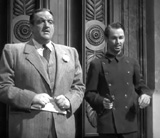 Inside Brewster's Office - Next to Willard Gates (Laird Cregar), Raven (Alan Ladd) Revealed Himself 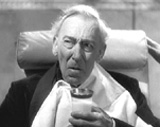 The Mastermind Behind The Sale of Poisonous Gas - Nitro Chemical President Alvin Brewster (Tully Marshall) 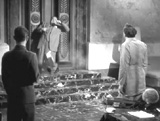 Deaths of Brewster and Gates 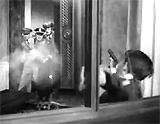 Barrage of Police Bullets Lethally Wounded Raven |
||||||
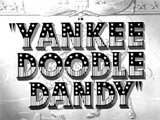
|
In a sad death-bed scene, patriarch Jerry Cohan (Walter Huston), delirious with drugs in the Cohan's country farm house, was with his famous singer/dancer/composer son George (James Cagney) by his side. They first talked about their family show The Four Cohans, and how they would have to cancel their upcoming booking for Des Moines, Iowa, and "pick it up on the way back." Jerry talked about son George's earlier playing of Peck's Bad Boy:
They also spoke about the final curtain call. George wept as he delivered the 'curtain call' on his father's life and collapsed into his father's arms. His father asked about the number of curtain calls during that night's performance and what the speech was. George told him, with a breaking voice, the film's most famous line:
His father cupped his hand on the back of George's head to comfort him and then expired - signaled by his hand falling limp. George kissed his father goodbye on the forehead. |
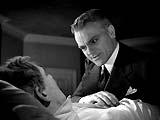 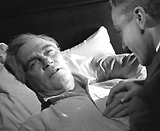 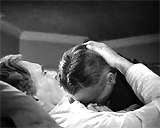 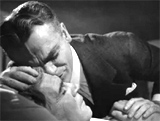 Death-Bed Goodbye - Father to Son |
||||||
(chronological by film title) Intro | 1915-1929 | 1930-1933 | 1934-1938 | 1939 | 1940-1942 | 1943-1945 | 1946-1947 | 1948-1949 1950-1952 | 1953-1955 | 1956-1957 | 1958-1959 1960-1961 | 1962-1963 | 1964-1966 | 1967-1968 | 1969-1970 1971 | 1972 | 1973 | 1974 | 1975 | 1976 | 1977-1978 | 1979 1980 | 1981 | 1982 | 1983 | 1984 | 1985 | 1986 | 1987 | 1987 | 1988 | 1989 1990 | 1991 | 1992 | 1993 | 1994 | 1994 | 1995 | 1995 | 1996 | 1997 | 1998 | 1998 | 1999 2000-2001 | 2002 | 2003 | 2004 | 2005 | 2006 | 2007 | 2008 | 2009 | 2010 | 2011 |